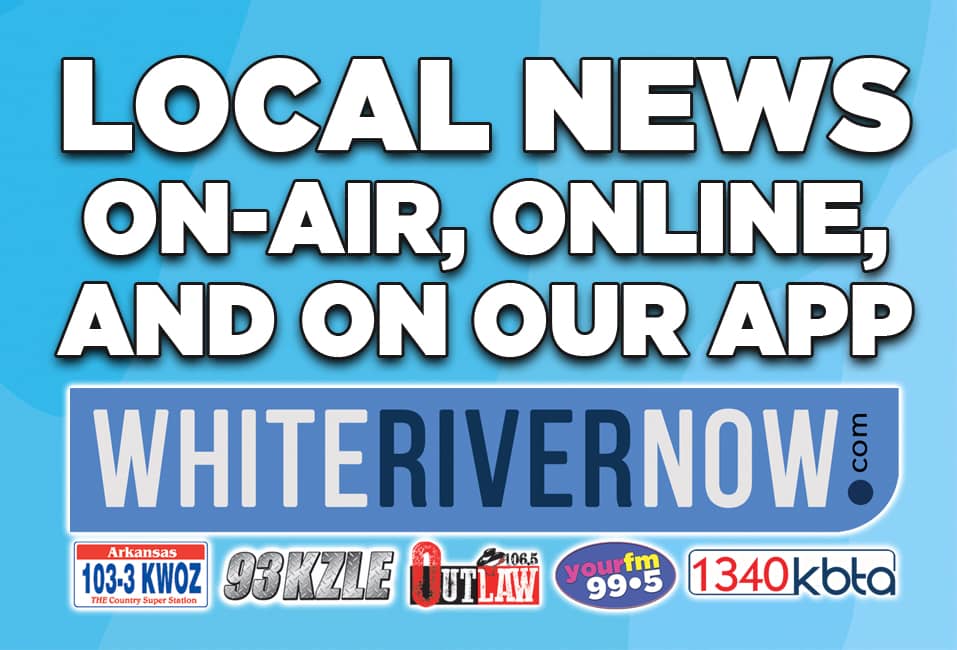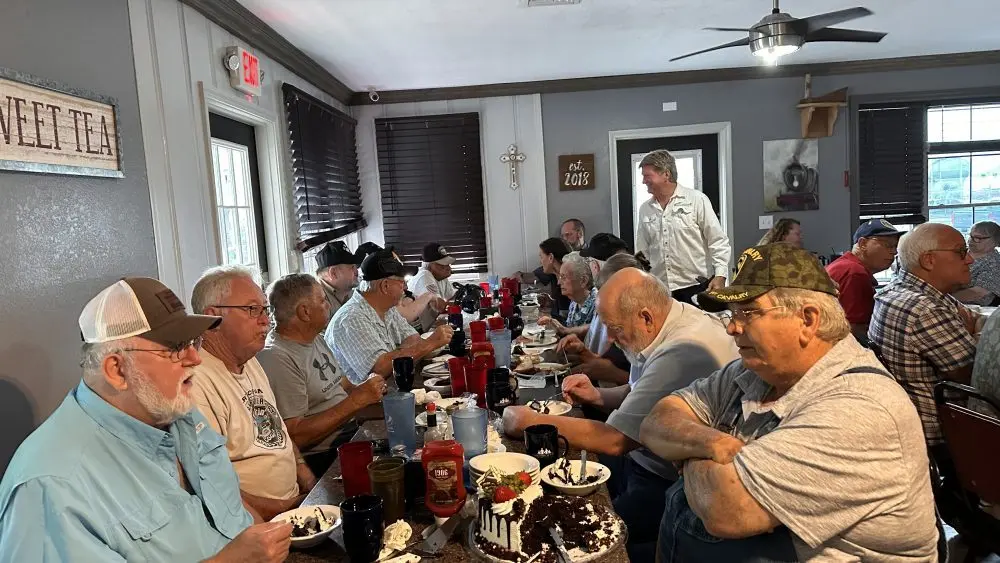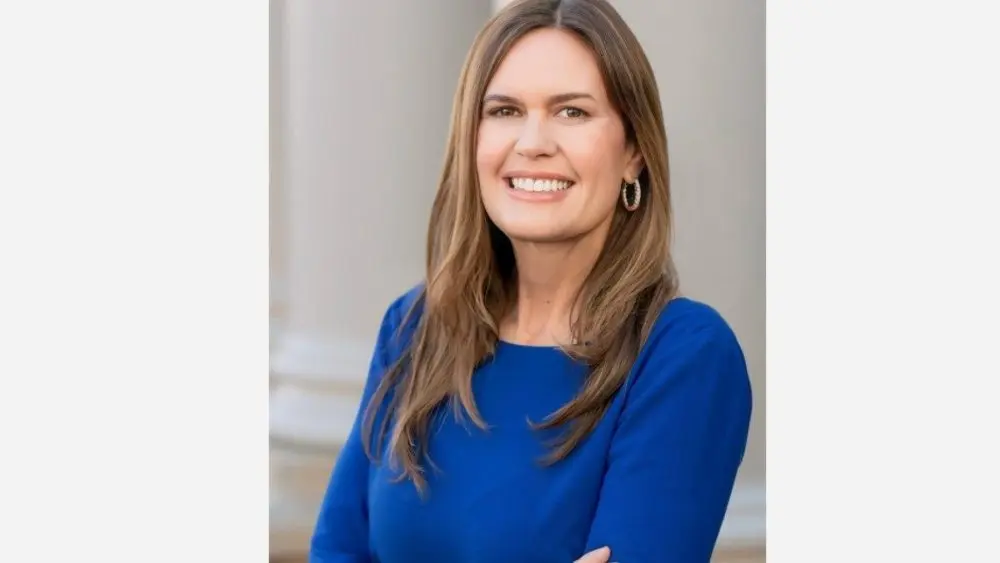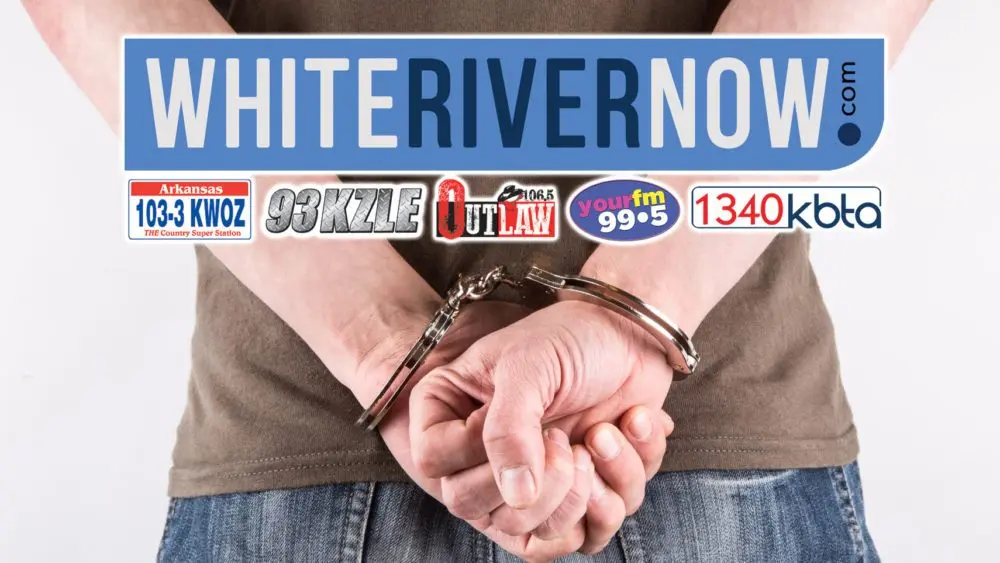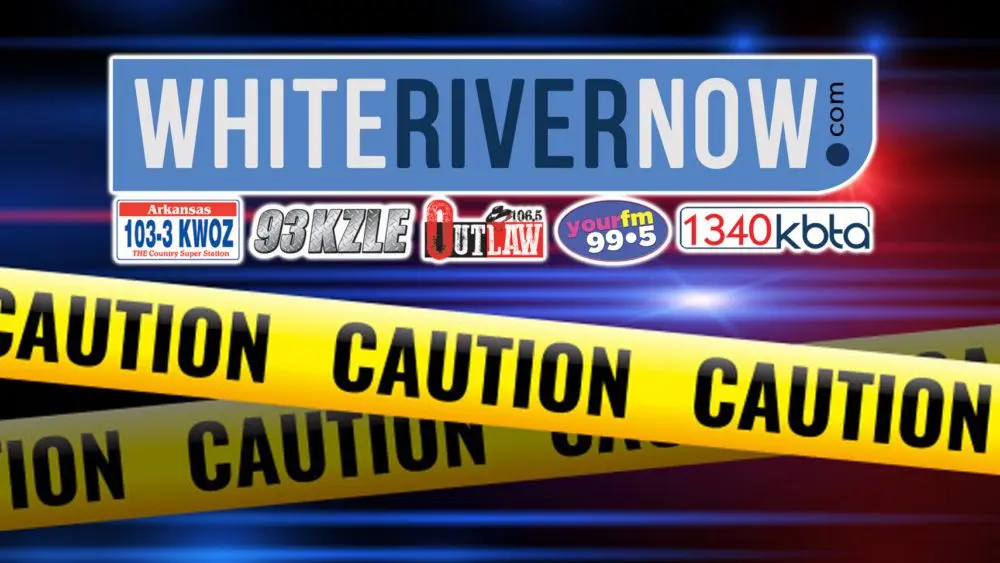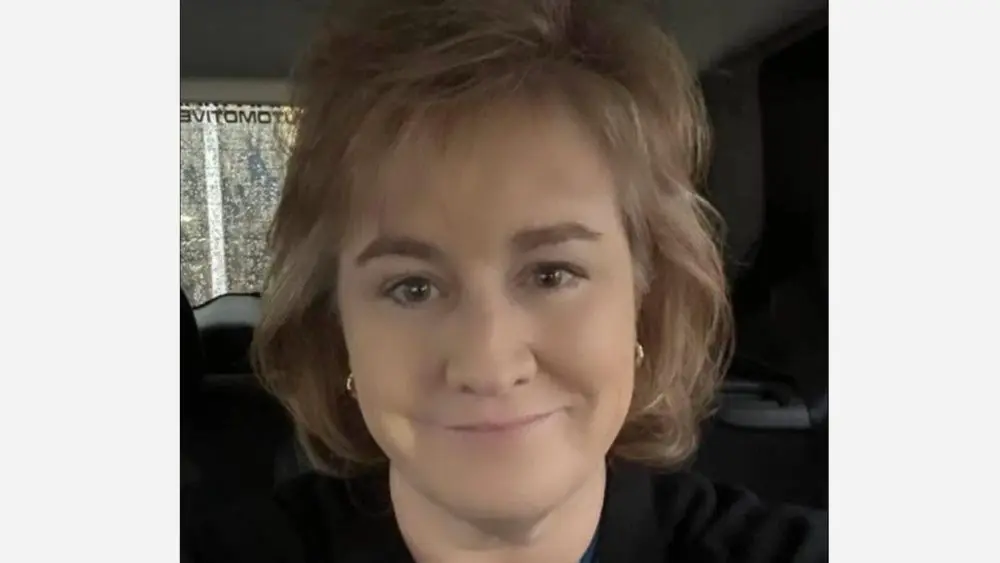Above: A recent gathering of veterans at their regular Friday morning breakfast at the Whistle Stop Café in Batesville.
This is the first in a two-part series about the weekly veterans’ breakfast held in Batesville.
By Andrea Bruner, White River Now
When Joe Dry needed a ride to his cancer treatments in Memphis, he reached out to Independence County Veterans Service Officer Josh Morrison, who hooked him up with another veteran who volunteers as a van driver for those needing a ride to and from medical appointments.
Dry may be a Navy man through and through, but when he met his driver, Gregg Taylor, Dry wasn’t going to tell the Marine no. Navy-Marine rivalry aside, the two found they enjoyed talking to one another and on the way home set a time to have coffee at McDonald’s.
That was in May 2022. Dry said one coffee led to a weekly meet-up, and word soon got out, with Morrison joining them and inviting a few other veterans as well. When they got to seven people, however, it was time to find a new breakfast spot so they could hear one another.
Now, the group has grown to around 30 veterans who come for breakfast at the Whistle Stop Café each Friday morning. The breakfasts are open-ended, so attendees can come and go at whatever time suits them. The group even inspired a weekly lunch in Melbourne at the Family Fork (the old American Burger Center) at noon on Tuesdays.
Dry said he’s only missed two or three breakfasts in the past three years, and those were due to illness and medical reasons.
“The group we’ve got – and hopefully we’ll get more – they’re great,” Dry said. “You don’t talk about military all the time, but there are a couple guys I knew in there from school and I probably wouldn’t have seen them anymore. … I really and truly love going on Friday mornings. I always griped about my alarm being set when I had to go to work; now I set my alarm on Thursdays so I can go on Fridays.”
He said there is a camaraderie that goes beyond the various branches of the military or even the years of service.
“People may not have been in same branch of service but you were there. You know how they are, and they know how you are. … You volunteered or you were drafted to lay your life on the line,” he said, explaining that it can be hard for civilians to understand “unless you’ve been there, raised your right hand and take the oath.”
Dry enlisted in the Navy in 1955 and served for 13 years. In that time, he was exposed to Agent Orange, which would lead to cancer and heart issues.
“When I first went to VA in ’05, I was told I had too many assets – and that’s not what I told when I went in the military,” Dry said, but Morrison helped him get his benefits. “Josh has worked his fanny off helping people. I know how they feel; I went without benefits for years.”
***
One of those is Dwane Thompson, 77, of Southside, who served three years in the Army.
When he received his draft notice in 1966, Thompson said it never occurred to him to try to get out of it.
He and two friends were on the upcoming draft notice, but they knew everyone being drafted were going straight into Infantry, which was a direct line to Vietnam.
“The lady at the draft board advised me to go into something where you would have a choice so that’s what I did,” Thompson said. “We all joined under what they called the buddy system back then. Three or more people could join together and you would stay together through basic training. I went into engineers, one went into MPs, and the other went into radio technology. We all ended up in Vietnam, and luckily, we all come back.”
Thompson went into an engineering division and was sent to the central highlands of Vietnam to widen an airstrip so the larger planes could land. The military had been using Agent Orange for several years as a vegetation killer to counter the thick jungle terrain, and the valley with the airstrip was among the spray sites.
“They sprayed it one day, and we moved in the next day – it was still dripping off the trees when we got there,” Thompson said. “It would get cool in the highlands, not cold but cool, and when we’d wake up there would be a big orange fog.”
When he came back from Vietnam, he flew into Washington. He was handed civilian clothes and told to change so the protestors wouldn’t accost him at the airport.
“They would throw stuff at you and call you names,” he said. “In the last 10 or 15 years, they finally started recognizing Vietnam veterans, and things like this (breakfast) is very helpful with that. Used to, you didn’t go around bragging you were a Vietnam vet – you were a baby killer. … You were the lowest part of the food chain. It was really disheartening. You go over there, and there were a lot of good guys that never made it home. It was bad.”
Thompson said the first claim he made was in 1972.
“I got out in ’69, and I had heart problems because of the Agent Orange, but the VA didn’t recognize it at the time. In ’71, I got a letter from Little Rock telling me to come update my records because they were going to be sent to an inactive file in Virginia.”
Thompson said he wanted to sign up for VA benefits but was told he was not eligible because he made too much money and had too much insurance. “I left there madder than a wet hen,” he said.
But he was talking to a friend later who said he needed to call the VA back because soldiers exposed to Agent Orange were in a separate category that should qualify him.
In early 1972, he was diagnosed with a cardiac arrhythmia because of his exposure.
“I worked for Batesville Truck Line, and I was in Melbourne delivering freight. All of a sudden, my heart went to beating really fast, and I didn’t have any energy,” Thompson said. “I thought I was having a heart attack.”
“I fought the VA for years and if it hadn’t been for Josh, I wouldn’t have anything,” Thompson said. “I would come to the office in Batesville and fill out the papers. A few weeks later I’d go back, and it was like I was never there. … They want to dishearten you so they don’t have to mess with you. That’s what it felt like, that they didn’t have time for you. You’d go back and there’d be a different person there, and you’d have to start all over again. When Josh came here, a friend of mine told me there was a new person and to go see him. He took all my records and instead of just saying, ‘I’ll send it in,’ he went right over to the fax machine. Within two weeks, he had the ball rolling – they were calling me and sending me to the doctor for examinations. He finally got my disability for me, 100 percent. … The biggest part of the people here, he’s helped.”
Thompson said he tries to attend all of the breakfasts and now has been attending the weekly dinners at Melbourne as well.
“I’m not any kind of a hero – I just did what needed to be done back then,” Thompson said. “Guys who were in the same boat you were in, you kind of have a bond, no matter where you were at, what branch you served in … when you served, no matter where you are from, you form a bond, and this (breakfast) group is the same way.
“It truly is a brotherhood.”
***
Gordon Lupkes agrees. Morrison had told him about the breakfast after Lupkes contacted him for help with benefits.
“The first time, I sat off to the side by myself. I talked to a few of the guys but not many. This time, we talked more,” Lupkes said. “I enjoy it.”
There’s something about sitting with other veterans, he said, even if they don’t talk directly about their service. Lupkes said he was going to be drafted and decided to join the Navy, just out of high school, at age 18. He served from 1966-70.
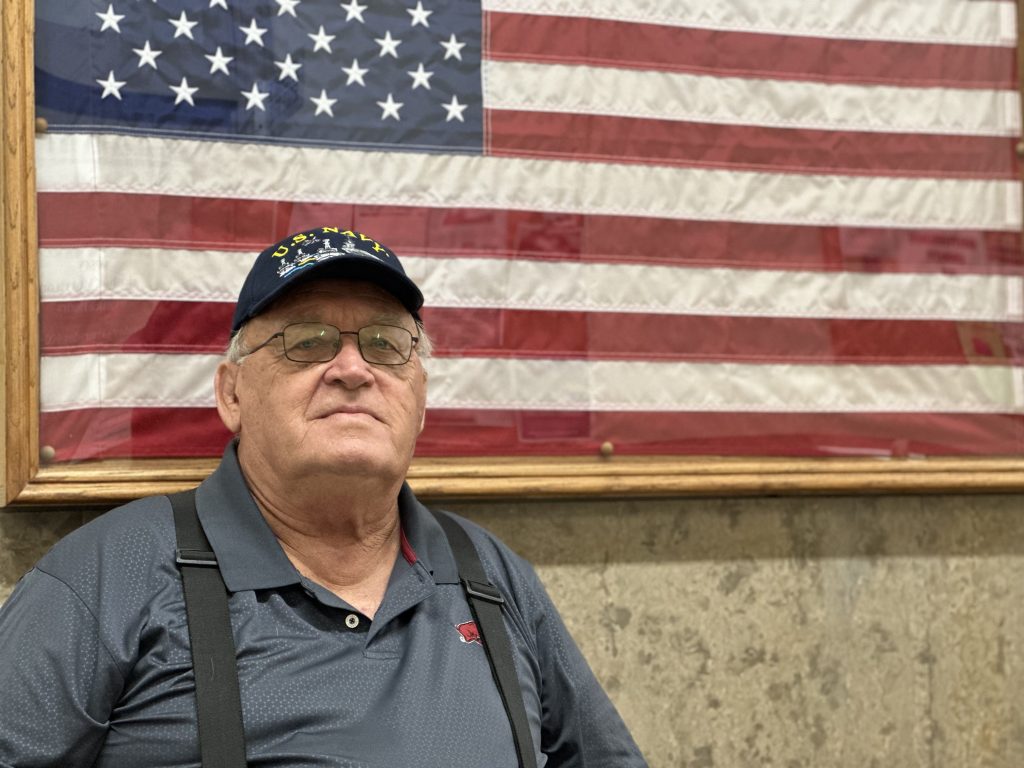 Gordon Lupkes
Gordon Lupkes
“I saw a little bit of protesting, but it wasn’t bad for me. I was from a small town in Iowa, and that’s where I went back to,” Lupkes said.
He said a few years ago, he came to Eureka Springs with his wife who was attending a class, and he happened to pick up a brochure about Mountain View.
“I thought that sounded like a neat place to go to, and about five years later we finally got down here and visited and just fell in love with it. We moved down here almost eight years ago.”
He said in 2022, he learned the aircraft carrier to which he was assigned, the USS Kitty Hawk, was being towed to Brownsville, Texas to be dismantled.
“I wasn’t going to go at first, but my wife talked me into it. … I was one of the older ones there, and just seeing the guys there really took me back. I didn’t figure I would see anyone I knew but there were some guys there that ran into people, and that was really neat. We were waiting for the ship to get into the harbor, and all of a sudden, there was a big scream from two guys that had run around together – it was the first time they’d seen each other,” he said, emotionally.
He said overall he has good memories of his service. “I think every kid – boy or girl – should go serve a minimum of two years, I don’t care who they care, even the president’s kid, just to grow up.”
Lupkes said he was in the aviation part of the Navy, working around fighter jets, and he ended up with hearing loss.
He’s been working more than a year, trying to get disability benefits, and the process has been very frustrating, he said.
“A couple times, I almost said forget about it,” Lupkes said.
***
Morrison said his job is more than helping veterans file for disability. Often times, he is finding resources and connections for veterans needing something as simple as transportation to appointments and treatments.
But the weekly breakfasts have turned into a sort of support group for veterans. “You don’t always see the suffering but that doesn’t mean it’s not always there.”
Some veterans are there every Friday, even after they’ve received benefits, which is something Morrison never expected. “I didn’t think anybody would come after they got their money. I have been proven wrong on my own self-doubt. The crew there lives off of each other – like a whole set of organs, they all work together. They all fit in.”
“People still call me and say, ‘I didn’t know there was a person there who could help do these claims,’” Morrison said. “If you do them by yourself, they’re overwhelming.”
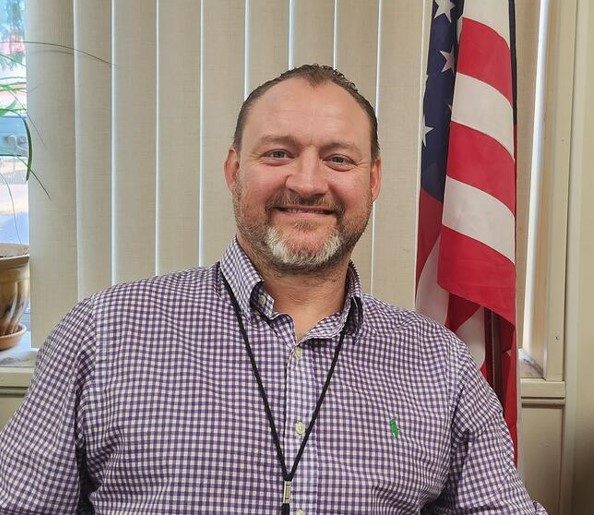 Josh Morrison / Image via Izard County
Josh Morrison / Image via Izard County
Morrison gives credit to the weekly breakfast group members for their assistance and support in the process of each veteran getting his or her benefits. It’s one thing to be around people you served with, but this group is entirely different – and unexpected, he said.
“To have a table full of Vietnam veterans, Iraqi veterans, Afghanistan, a Korean War veteran, Army, Navy, Air Force, Marine – we all come religiously on Fridays. It’s still amazing to me that people come past the disability checks,” Morrison said.
Don Crispell was one of the original breakfast club members. Morrison had helped secure the benefits for Crispell, who was diagnosed with throat cancer, and invited him to join the group when it was still meeting at McDonalds.
Crispell died in June, and now there’s a Navy cross over his seat the breakfast. His wife came to the breakfast on his birthday.
“We all called him Mr. Waffle,” Morrison said. “We miss him.”
***
Gregg Taylor, who enlisted in the Marines in 1981 and served through 1987, said he and Dry hit it off at their first meeting as both are “a couple of regular Arkansas boys” with a strong sense of patriotism.
The connection spilled over to the other veterans who come. “They’ve been through some of same experiences as you,” he said. “We’re all doing it for America.”
He spent time in the Far East, serving in Japan and the Philippines, and there are things he can’t discuss with “regular friends,” but said he feels that connection with the other veterans at the breakfast meetings.
“With 30 of us there, I don’t get to sit with Joe every week, but I can sit with anyone and talk to them.”
Dry concurred. “You can talk about things and they know what you’re talking about. When you say something, they may not have been there – they may not have done exactly that – but each know what you’re talking about. … You feel like they’re one of your buddies, you’ve all got something in common.”
***
“That breakfast group is a family,” Morrison said, adding that whether it’s taking a fellow vet to an appointment or just cheering them on, the friendships made within the group will last a lifetime. “We take you in. If you want to be there – come. Be a part of us.”
Dry and Taylor both said they never dreamed that their meet-up for coffee would turn into breakfast with 30 people showing up week after week, three years later.
“You see people there every week – you miss them when you’re not there,” Dry said. “We did not start meeting for this purpose but I think it’s great. It seems like the more is there the better it is.”
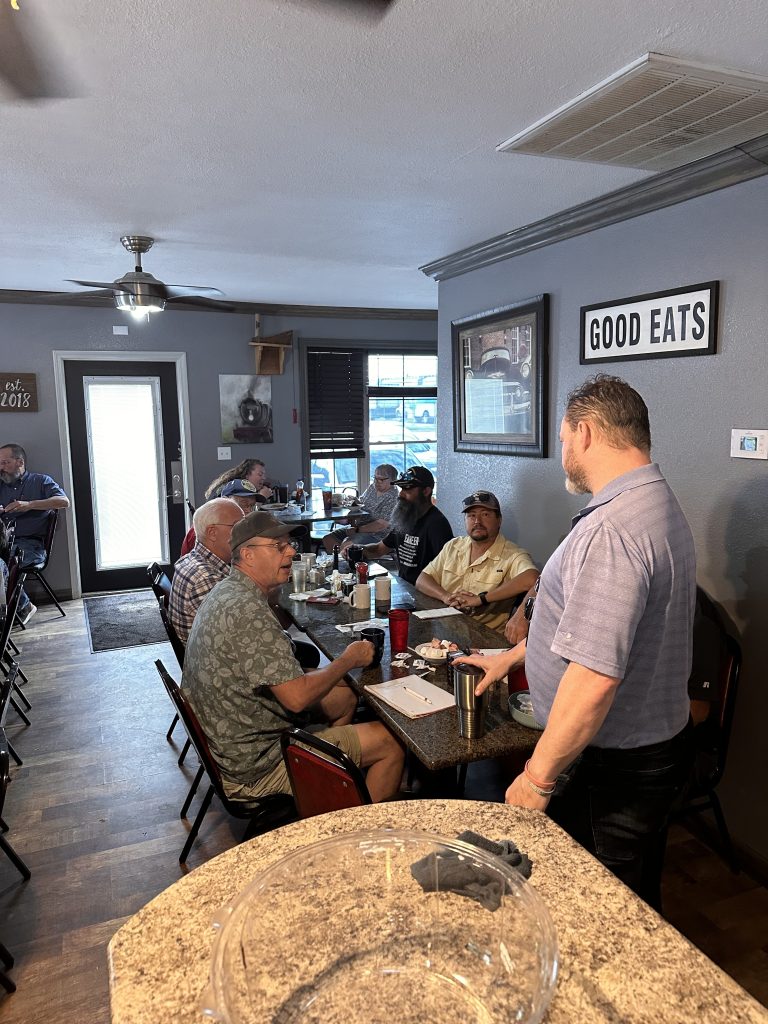
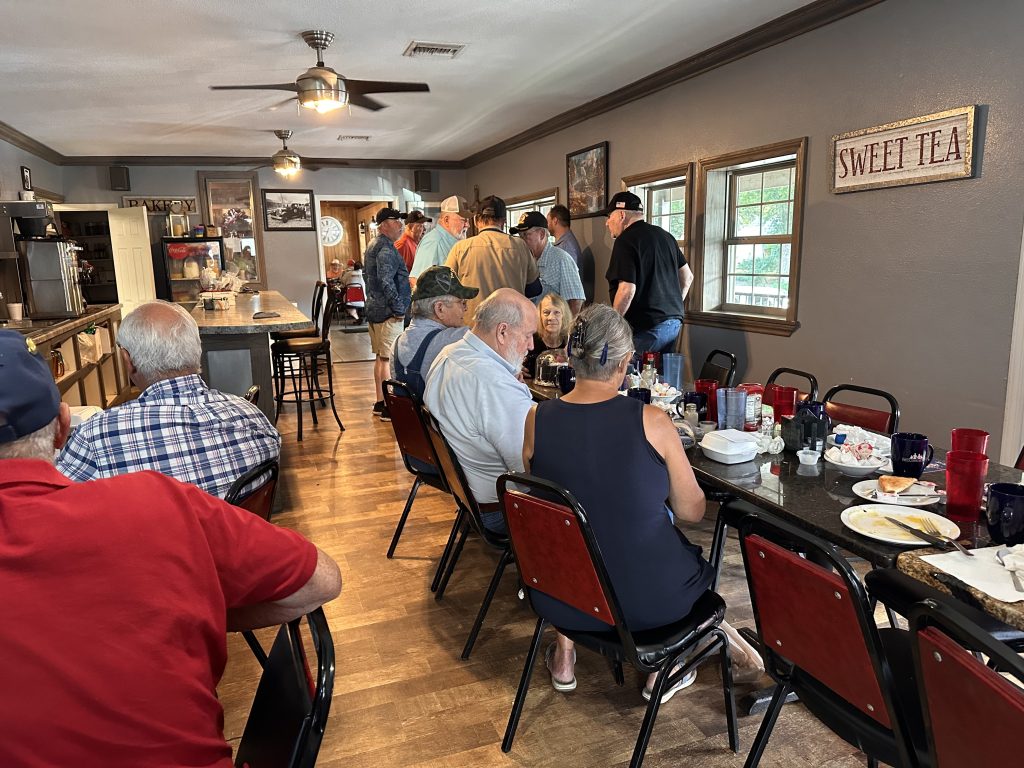
All images (except where noted): Andrea Bruner, White River Now
Have a news tip or event to promote? Email White River Now at news@whiterivernow.com. Be sure to like and follow us on Facebook and Twitter. And don’t forget to download the White River Now mobile app from the Google Play Store or the Apple App Store.
Get up-to-date local and regional news/weather from the First Community Bank Newsroom on Arkansas 103.3 KWOZ every weekday morning and afternoon. White River Now updates are also aired on weekday mornings on
93 KZLE, Outlaw 106.5, and Your FM 99.5. Catch CBS News around the top of every hour on 1340 KBTA.
